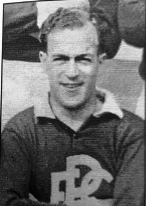Preston Football Club were fortunate that Brunswick de-listed Ted Henrys early in 1951 after he had struggled to win a regular spot in the side in 1950 despite having played 70 games over five seasons up until then.
After trying out with Richmond prior to the Second World War, Henrys had been used as a utility player by Brunswick and was never allowed to settle into a permanent role.
He retired at the age of 26 and had some hopes of securing a role as a playing coach in the country, but was convinced by his wife, Judy, to try out at Preston.
Henrys debuted in the second round against Williamstown on a half-back flank, but somewhat fortuitiously for him an the club, long term injuries to both the senior and seconds fullbacks forced Preston to move him to full-back in future games.
Something magically clicked, and from the key defence position, Henrys won Preston’s Best and Fairest three years in succession.
In 1952, he polled 18½ votes to finish eighth in the J. J. Liston Trophy, and given his great form in 1953, it was no surprise that he went on to win the Liston and represent the V.F.A. at the A.N.F.C. Carnival.
Henrys wasn’t a big man at 5’10 (178cm), but despite playing one game in the Carnival at full-back against South Australia’s Clayton “Candles” Thompson, who stood 6’6” (200 cms and then the tallest to ever have played at the senior level), he won an blazer in the first ever All-Australian side, his team-mates including such Victorian legends as John Coleman, Jack Clarke and Bill Hutchinson (Essendon), Bob Rose and Des Healey (Collingwood), Brownlow Medallist Bernie Smith from Geelong and another V.F.A. representative from Victoria, Frank Johnson of Port Melbourne. “Candles” also earned an All-Australian, kicking six goals against Henrys after a bag of ten v. Western Australia a few days before.
He and Johnson (twice) were two of only four V.F.A. players to ever win All-Australian honours.
The Sporting Globe Football Annual in 1954 under the heading “Meet the Champions” described Henrys as “the sweetest drop-kick in football”, and he was credited with a 76 yard drop-kick in a competition at Preston in 1951.
On retirement from his playing career, Henrys acted as assistant coach at Preston for several years, and then became a television commentator for ATV-0 along with Phil Gibbs when they commenced coverage of V.F.A. games in 1968.
In between these times, he had returned to his old club, East Brunswick as captain-coach and in 1957 and 1958 organised “past players” matches between East Brunswick and Preston at Cramer Street in aid of the Royal Women’s Hospital Appeal – the first time that admission was charged on a Sunday at the ground.
In later life, Ted moved to Ballarat and was a regular attending North Ballarat games when the Bullants ventured to the country venue. He passed away on 11 March, 2014 at 89 years of age with several members of his family at his bedside.
Although not commonly known, he was born in Moonee Ponds on 15 October, 1924, but as Edward Raymond HENRY and it was under this name that he served as 120275 as a Leading Aircraftman with a Signalling Unit in the R.A.A.F. during the Second World War, enlisting on 29 October, 1942 while living in North Fitzroy.
For some reason he had always used the name HENRYS. He served as HENRY until 6 March, 1946, but after military authorities had noted the variation, on discharge he changed his name by deed poll to HENRYS.
“The first thing that impressed me about Henrys as he played against Tasmania in the V.F.A.s opening game in Adelaide was the ease of his drop kicking. I was seeing him for the first time. In fact, he was just one of 36 players on a waterlogged ground fighting for possession of a white ball. But when 35 others were grubbing the wet ball or mis-kicking it, Henrys drove in drop kicks over 55 or 60 yards. He commanded notice“.
(Hec De Lacy, Sporting Globe, 29 July, 1953
